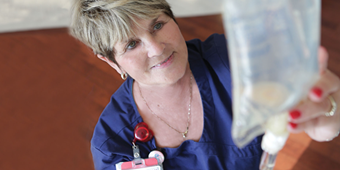Everybody’s Doing It; How About You?

Answer a few questions and we'll provide you with a list of primary care providers that best fit your needs.
Your neighbors are probably doing it. Your friends may be doing it. Is it time for you to be doing it, too?
You probably don’t want to think about it, but everyone has to do it at some point in their lives. We’re talking – gulp – colorectal cancer screenings.
According to the Centers for Disease Control and Prevention, 60 percent of deaths from this common cancer could be avoided with screening.
That’s because colorectal cancer starts with polyps in the colon. While these polyps are harmless at first, some can develop into cancer. Finding them early leads to earlier treatment and greatly increases the chances of beating the disease.
Who Should Be Screened for Colorectal Cancer?
You need to be screened for colorectal cancer if:
- You are between the ages of 45 and 75 (If you are over 75, the decision to screen is made on an individual basis with your doctor.)
- You have a personal or family history of polyps or colorectal cancer
- You have a history of other cancers, including breast, ovarian, or endometrial
- You have irritable bowel syndrome, ulcerative colitis, or Crohn’s disease
- You have a history of radiation to the belly
The screening process begins with a visit to your doctor. Make sure to mention whether there is a family history of colorectal cancer or polyps. Your doctor may do a digital rectal exam – inserting a lubricated gloved finger into the rectum. The test is painless and takes less than a minute.
This rectal exam alone, however, is not enough. Your doctor may ask you to undergo one of the following screening tests, as recommended by the U.S. Preventive Services Task Force and the CDC.
Colonoscopy
Colonoscopy is the only colorectal cancer screening test that also provides a layer of prevention, says Kenneth Reed, DO, with Premier Gastroenterology Specialists. The doctor uses a long, thin, flexible and lighted tube to check the entire colon as well as the rectum. Some tubes include a device that allows the doctor to also remove polyps and some cancers. Colonoscopy also is used as a follow-up test if anything unusual is found during one of the other screening tests. Health professionals recommend having a colonoscopy once every 10 years if you have no personal or family risk factors. The test is given every five years if you have a history of polyps or a personal or family history of polyps or colorectal cancer.
60 percent of deaths from this common cancer could be avoided with screening.
Fecal Occult Blood Tests or Fecal Immunochemical Test
For these tests, your doctor will give you an at-home kit. You will collect a small amount of stool and return the sample to the doctor or a lab, where it will be checked for blood that can't be seen with the naked eye. This test usually requires three samples in a row and is done yearly. Blood in the stool does not mean that you have colorectal cancer, however, and your doctor will most likely follow up with a colonoscopy. Fecal occult blood tests have a 15 percent false positive rate and generally are not used to screen for cancer, says Dr. Reed.
Fecal Immunochemical Test (FIT)
This DNA stool test studies a stool sample for genetic changes that may be a sign of colorectal cancer. FIT tests do not look for polyps; they just check for possible signs of cancer. Patients like the FIT test because it does not require the prep of a colonoscopy, says Dr. Reed. But he only recommends it for patients to whom colonoscopy poses a risk.
Barium Enema
For patients who cannot have a colonoscopy, the American Cancer Society and National Cancer Institute recommend double-contrast barium enemas. In this test, the patient is given an enema of barium, which makes the colon and rectum stand out on x-rays.
CT Colonography
Virtual colonoscopy, or CT colonography uses computed tomography scans to make a series of pictures of the colon. Researchers are comparing the effectiveness of virtual colonoscopy to commonly used colorectal cancer screening tests. Currently, health insurance companies do not pay for CT colonography as a first-line screening test, says Dr. Reed.

Reduce Your Risks for Colorectal Cancer
While the idea of colon cancer screening is unappealing, to say the least, it saves lives. The CDC reports that nearly a third of Americans between the ages of 50 and 75 have not had the screening.
About one in three people who get colorectal cancer will die from it, says Dr. Reed. Colorectal cancer is the second-most common cancer diagnosed in women.
Screening is one way to reduce your risk factors. Dr. Reed says you also can make lifestyle changes that will help, such as:
- Maintain a healthy weight
- Get regular exercise (Shoot for 10,000 steps a day)
- Eat a diet rich in vegetables, fruits and fiber
- Avoid processed and red meats
- Avoid tobacco
- Limit alcohol intake
- If you have diabetes, manage it well
Don't become a statistic – if you're at risk (and we all will be once we hit 50), talk to your doctor about a screening now.
Answer a few questions and we'll provide you with a list of primary care providers that best fit your needs.
Source: Centers for Disease Control and Prevention; National Cancer Institute; American Cancer Society; American Society of Clinical Oncology; Kenneth Reed, MD, Premier Gastroenterology Specialists





